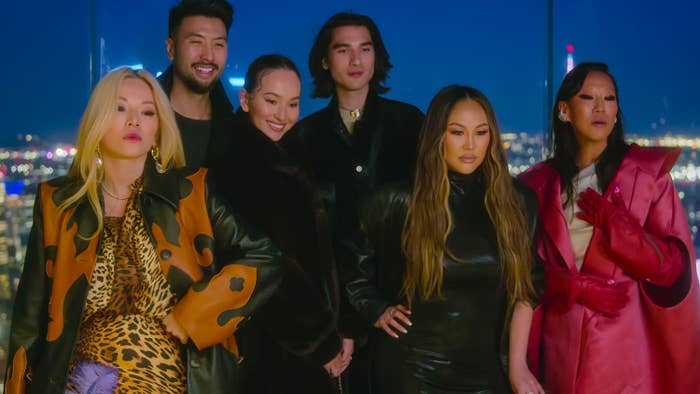
Bling Empire, the 2021 Netflix reality TV series about a group of rich Asians living in Los Angeles, has released a new spinoff set in New York. Once again, the series follows the petty dramas and personal crises that unfold within a new group of quasi friends who don’t seem to know all that much about one another aside from the fact that 1) they are Asian, and 2) they are all filthy rich or aspire to be filthy rich. A lot of it is trivial and predictable — fashion, glitz, gossip, and low-stakes in-fighting — except for one central tension in the show: whether Richard Chang, an executive at a medical company and this season’s less wealthy interloper, is gauche for asking his friends Dorothy Wang, a reality TV star, and Tina Leung, a fashion influencer, to help support his charity event for pancreatic cancer research and to help promote his business.
Bling Empire, like other reality series, has mostly indulged in gross materialism but with an added sprinkling of ham-handed cultural exposition as one of the few American shows featuring an Asian and Asian American cast. It debuted in early 2021, when incidents of anti-Asian racism and violence were rising during the pandemic, and as a Chinese American, I was drawn to the show, curious how it would deal with race, culture, and wealth. Past seasons mostly put the lifestyles of über-wealthy Asian people on a platter for audiences to devour with some awe but little critique. Yet the conflict between Richard and Tina and Dorothy raises interesting questions about who calls the shots in relationships between people with vastly different resources, how to mix business and friendship, and whether social climbing is inherently dirty.

The show follows Dorothy, a woman from an affluent family, from Beverly Hills to New York City, where she reunites with her friend and fashion influencer Tina, whose father once did well producing baby products (he had a private jet and bodyguard, “but then that disappeared,” she said). She became financially independent in her 20s as a fashion blogger and then an influencer.
Soon after Dorothy arrives, Richard — who isn’t 1 percent–level wealthy but intent on making his way up — wrangles Dorothy, Tina, and other friends at a party and asks as “a favor” if they have anything to donate for the silent auction at his fundraising event. Tina jokingly suggests auctioning off Dorothy for a date. But Richard takes the liberty of auctioning a double date with both Tina and Dorothy without their consent. Richard also asks Dorothy to post about the event, to find a celebrity guest, to invite her friends, and to donate, she complains. She knows Richard’s mother has cancer, but, she says, “I feel he plays the mom card.”
The conflict between Richard and Tina and Dorothy raises interesting questions about who calls the shots in relationships between people with vastly different resources.
Ultimately, members of this elite clique view their resources — earned or inherited — as theirs to spend, on their terms, on themselves and those they care about. “Richard asks a lot of everyone,” Tina says. “I don’t even have time in my day to even do anything else. So he needs to calm down a little.”
“When you grow up with money, it’s kind of hard to find friends,” Dorothy says in a confessional. “I want to be generous and giving, but, like, I just met you. This is why I can’t be nice to people.”
Both Dorothy and Tina have insomnia and keep each other company through sleepless nights. Richard calls them one night and name-drops his medical company, saying it offers services that can help — acupuncture and treatments for stress, anxiety, or depression — and that he will make an opening for them, as friends. After the call ends, they dismiss the invitation, calling it a “loaded pitch.” The two never show up at the appointment or text Richard to give him a heads-up. “How could friends put me in the position to look so bad at work?” Richard asks, embarrassed.
Confronted about their absence, Dorothy and Tina say they never asked him for an appointment. They say his invite came with texts saying, “This is very important to me and the mental health space so I hope you will help me tell this story in the best light.” Richard says he’s offered Dorothy help with anything she’s needed since arriving in New York; she responds that she’s never asked him of anything, but that he has asked a lot of her. He tells Tina that he is inspired by the size of her audience and her potential to change the world. She responds that when they hear words like “your audience,” they feel exploited.
Bling Empire isn’t about Asian people; it is about rich people of Asian descent, and this season touches lightly on inequality and opportunity, even if it is between those whose resources are abundant and those whose resources and influence seem limitless. Unlike previous seasons in which the LA group’s one friend who isn’t wealthy, model Kevin Kreider, seems to be naively content to tag along (at the expense of being called a freeloader) and gawk at their excesses, Richard is desperate to rise to their level of riches and clout — and it causes conflict. Wealthy people are not used to feeling exploited, and they have the privilege of saying no.
As a native New Yorker, I mainly watched this season to see how it would treat my hometown. In some ways, New York City is an obvious setting for this show: It is home to more Asian people than any other city in the US, and the population has been growing quickly. Yet 23% of the city's Asian residents are living in poverty. The ways Bling Empire fell short should have been obvious to me. While it incorporates cultural themes viewers might relate to — challenged relationships with parents, rituals celebrating Lunar New Year or honoring the dead, and lots and lots of food — the boring hopes of the average Asian person trying to get ahead were never what this show was about.
Still, I was puzzled that a show with an Asian cast and an Asian fanbase would lovingly spotlight the Greek immigrant community in Queens’ Astoria neighborhood while chastising the Asian American cast member who was actively, if clumsily, pursuing the American dream: Richard.
I can’t help but be on Richard’s side. But the show makes it harder to sympathize with him than it should — he is not a likable underdog. His portrayal is of an egocentric man who is unaware that his acts of kindness come off as self-serving. He seems more motivated by a desire to appear magnanimous than any intuition about (or interest in) what people actually need or want. Richard, who was raised by his mother after his parents divorced, is unapologetically focused on success and upward mobility. His Instagram handle is @chairman_chang. He is no stranger to the power of networking. These things make me feel embarrassed for him, but I also understand his anger. What kind of friends wouldn’t use their social media to help support cancer research when your mother has cancer? Or call to let you know they won’t make it to your clinic? What this tiff reveals is that Richard just isn’t very good at networking, not at this level.
Writer Xochitl Gonzalez recently made a compelling case to destigmatize social climbing in the Atlantic, as cultivating these relationships can meaningfully improve a person’s lot in life. Wealthy people, Gonzalez argues, constantly use their social capital for advancement, but it is widely perceived as their right. When someone from another class tries to move up, on the other hand, social climbing is seen as a brazen transgression, a moral shortfall. “Wealth, and the things it can procure—elite education, invitations to private clubs, stays at exclusive resorts—come with a cascade effect of trust, merited or not,” she writes. For those who aren’t wealthy, who don’t have this privilege of trust, the secret to successful social climbing is “not about seeing what people can do for you, but rather seeing people. You learn where they grew up, what books or shows they like, how old their kids are, what you might have in common. You get into the room not to use people, but to know people.”
On Bling Empire, even Dorothy tacitly acknowledges this: “I’m surprised by how tactless Richard is, right? You’d think he’d be better at it.” She tells him their exchanges have been more about extraction and taking, and less about friendship. She makes it clear to Richard that she hasn’t asked anything of him — he can’t offer her anything she needs.
If we are to make relationships across class lines, it is silly to pretend that people come to the friendship with equal things to offer.
But how could he? Materially, she can procure anything she wants, including an appointment at his medical center. What Dorothy and Tina seem to desire, that Richard doesn’t understand, is peace of mind so they can sleep, an empathetic ear for their troubles, and lavish, carefree people to enjoy a lavish, carefree life with. These are not easy things to offer when you have limited finances and a sharp determination to climb the ladder. Still, if we are to make relationships across class lines, it is silly to pretend that people come to the friendship with equal things to offer. I believe without question that the burden of generosity and understanding should fall on the shoulders of those in a position to help. Why shouldn’t they bring more to the table?
Perhaps we can all learn from poor, foolish Richard, whose greatest flaws are not his goals but his lack of grace and the shadow his own ambitions cast on his relationships. “All around me, there’s all these successful people doing amazing things: Billionaires, tastemakers, CEOs,” Richard says, calling himself “bling adjacent.” “You can’t help but feel a little envious.”
So much of New York — the best parts, I would argue — isn't about bling. It’s about the vibrancy generated by the unimaginable metabolism of millions of people who are here to build better lives for themselves. And the show forgets that this, above all else, is something to be celebrated, even if it is a little gauche.●
